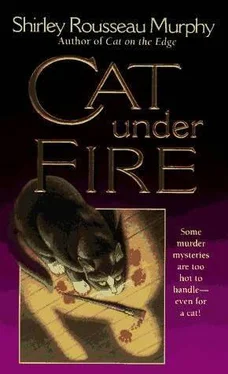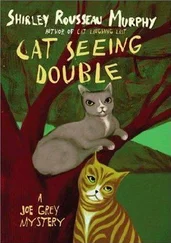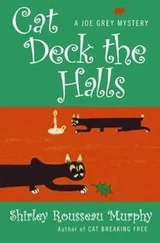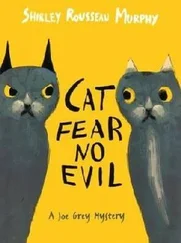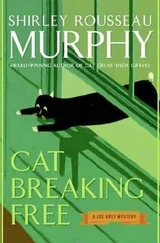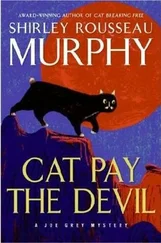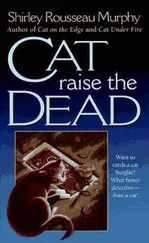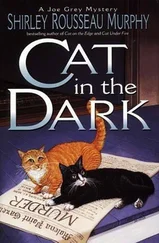They glimpsed something shiny through a back window, then the window went blank, reflecting the tree's sword-sharp leaves. They could see, within the leafy reflections, only a hint of the driver's profile. The car had parked just above the second mark, where the officers could look down into the backyard. "Harper's doing it up fancy," Joe said. "Three stakeout cars."
"I can hardly believe he's done this just on the list and phone call. Maybe it's because Stamps is on parole."
"Who knows? Maybe Varnie has a record, too."
"Wouldn't surprise me." She licked a whisker, studying the arrangement of the three cars. "They can see every house on Stamps's list."
The burglars would have to move up and down the hill as they followed the homeowners' individual schedules of departure. By the time they had finished, if the cops let them finish, they would be working in full daylight, in full view of the neighborhood. But what neighbor, seeing Varnie's signs and perceiving the old truck's altruistic mission to collect cans and newspapers for recycling, would question its presence?
Now, on the street below Janet's, the car doors opened without sound. Two officers emerged and started down the hill into the backyard of the second mark. "They're going to make the arrest down there," Dulcie said. "After the second burglary."
"Maybe."
"Let's beat it down there. I want to see them nail those two."
"If they make the arrest here, we'll miss it. Once they have the evidence here, why would they let Varnie and Stamps trash another house?" Joe said.
"To make a better case? You go down. If we split up, one of us will get to see how it ends."
He looked at her warily. "Will you stay on the roof, not go nosing around the windows?"
She smiled.
"Come on, Dulcie. It's stupid to go over there."
"Promise," she said sullenly.
He studied her.
"I promise." She lashed her tail and hissed at him.
He growled, cuffed her lightly, and left the roof, backing down the rose trellis. But she worried him. If she did go over there, and if the police moved in fast, she could get creamed.
But he couldn't baby-sit her. He sped down the hill across the brightening yards, down past Janet's. As he neared the second mark he glanced back to where Dulcie crouched. Yes, she had stayed put. He breathed easier. On the peak of the roof she was a small dark lump, a little gargoyle against the paling sky. He moved on, toward the stakeout.
The minute Joe disappeared down past Janet's, into the yard of the second house, Dulcie crept to the edge of the roof. Crouching with her paws on the gutter, intently she watched the Hamry house, following the swinging glow of the burglars' flashlight behind the dark windows. The men were taking their time. But why not? They had half an hour before the next house would be empty. Their flitting light was as erratic as a drunken moth. She could imagine them in there pulling open drawers and cupboards, collecting small, valuable items, maybe jewelry or guns or cash.
The shadowed bushes in the Hamry yard would make excellent cover. She was about to swarm down the trellis when she saw, in the bushes at the far side of the Hamry drive, a dark figure crouching. A man knelt there. She hunched lower over the gutter, watching.
His clothes were dark, but when he turned she saw the flash of something shiny. A gun? She watched intently until the gleam came again.
The object was round, very bright. Maybe it was a camera lens, reflecting light from the paling sky. The man half rose, moving forward in a crouch. He must not have made a sound, the dog didn't turn-the mutt stood in the truck watching the house as if listening to the sounds of his master diligently at work.
From the bushes, the officer would have a perfect camera shot of the truck, and of the inside of the garage as the burglars emerged.
She wondered if this might not be considered entrapment. But Judge Wesley and Judge Sanderson were both old-fashioned jurists, strong-willed and not easily coerced into dismissing for such legal niceties. If a man was guilty, he was guilty.
Watching the photographer, she backed down the trellis, fled across a stretch of open lawn to the Hamry lawn and into the bushes, pausing only a few feet from the crouching officer. She hadn't made a sound.
From this vantage, she could see deeper inside the garage, could see the door into the house, could hear from within, intermittent soft thuds, as if heavy objects were being moved. She heard Varnie swear softly, then the inner door opened.
The two men came out, Stamps carrying a television set, Varnie clutching a CD player and two speakers. Across the drive, the hidden officer raised his camera.
The photographer followed every move with his lens as the men loaded the truck. The soft click of the shutter was hardly audible above the men's whispers and above the creaks of the truck springs. They returned to the house for a second TV, a microwave, and for several cardboard boxes and two plastic bags sagging heavy with unidentifiable objects. Watching, she crept out of the bushes.
The dog snarled. Dulcie froze. He came flying off the truck, straight at her.
But he flew past, leaped at the photographer. Knocked him backward, sent the camera flying. Before the officer could roll away, the dog was at his face. The officer beat at him and fought; the dog was all over him, it would kill him. Dulcie launched in a flying leap onto the dog's back and dug in. Raking and clawing, she grabbed a floppy ear and clamped down.
The dog whirled shaking his head. Loosing the officer, he plunged and bucked, snapping at her. She clung, raking. His teeth gnashed so close she smelled his meaty breath. One more twist and he'd have her. Clawing his face, she leaped away, ran.
Speeding up the hill with the dog behind her, she heard Stamps shout, "Get back here, get the hell back in this truck."
And Varnie screamed, "Leave the damn dog."
The dog was gaining. Why did I do that? She fled in panic toward a stand of thick brambles, dived beneath the matted growth. What the hell did I do back there? Beg to be eaten alive. That young cop could have shot the damn dog.
Except the dog had knocked him off-balance, was at his throat, could have severed the jugular before the man drew his gun.
The dog plunged into the brambles behind her. She streaked away beneath the branches, and he crashed behind, breaking through-he couldn't see her, but he could smell her. She ran, dodging.
The bushes ended.
She crouched, panting, at the edge of the open hill. He was nearly on her, panting, seeking.
There was nothing above her but a vast plain of short grass. No building, no real tree, only a few spindly saplings.
She bolted out and up the hill, racing for her life.

Her paws hardly touched the ground, skimming over the matted grass. Fear sent her flying uphill. There was no shelter above her, only a few tiny trees, hardly more than tall weeds. And behind her the dog gave a burst of speed, snatching at her tail. She jerked away, the tip of her tail blazing with pain. Scorched by terror, she desperately angled toward the nearest sapling, wondering if it would hold her. Leaping for the thin trunk, she swarmed up.
She was hardly above him when the dog hit the tree, bending it. She clung only inches above his snatching mouth, and the tree snapped back and forth under his weight, the little trunk whipping as if it would break She tried to climb higher but the thin branches bent. The bark was slick, the trunk too small to grip securely. The tree heaved. Its dry pods rattled, and the smell of bruised eucalyptus filled the wind. The dog leaped so high his face exploded at her, teeth snapping inches from her nose, and she could not back away.
Читать дальше
